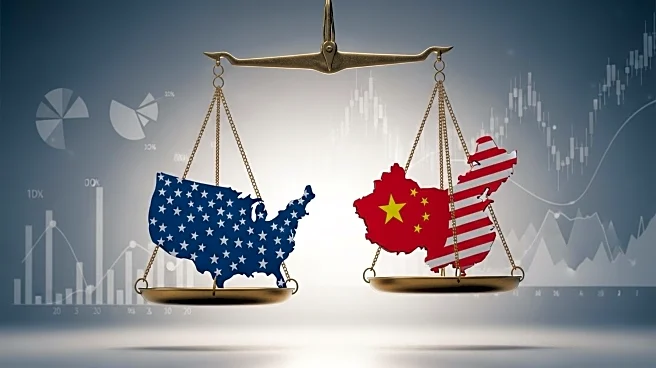What is the story about?
What's Happening?
President Trump announced he is considering a significant increase in tariffs on Chinese imports, leading to a sharp decline in U.S. stock markets. The Nasdaq fell over 2%, with technology shares and U.S.-listed Chinese firms experiencing substantial losses. The Dow Jones and S&P 500 also saw declines. Trump's comments have raised concerns about a potential revival of the trade war between the U.S. and China, which had been paused earlier this year. The announcement has caught the market off guard, contributing to increased uncertainty and market jitters.
Why It's Important?
The potential increase in tariffs on Chinese goods could have significant implications for U.S. industries, particularly technology and e-commerce sectors, which are heavily reliant on Chinese imports. The market reaction underscores the sensitivity of global trade relations on U.S. economic stability. A renewed trade war could disrupt supply chains, increase costs for businesses, and ultimately affect consumer prices. Investors are concerned about the impact on market valuations, which have been high, and the broader economic implications of escalating trade tensions.
What's Next?
If President Trump proceeds with the tariff increase, it could lead to retaliatory measures from China, further straining diplomatic relations and impacting global trade. Stakeholders, including business leaders and policymakers, will likely engage in discussions to mitigate potential negative impacts. The situation may also influence upcoming diplomatic engagements, as Trump has indicated he may not meet with China's President Xi Jinping as planned. Market analysts will continue to monitor developments closely, assessing the potential long-term effects on the U.S. economy.
Beyond the Headlines
The tariff increase proposal highlights the ongoing complexities of U.S.-China relations and the broader geopolitical landscape. It raises questions about the effectiveness of tariffs as a tool for negotiating trade agreements and the potential for unintended consequences on global economic stability. The situation also reflects the challenges of balancing domestic economic interests with international diplomacy, as well as the role of presidential decision-making in shaping economic policy.















